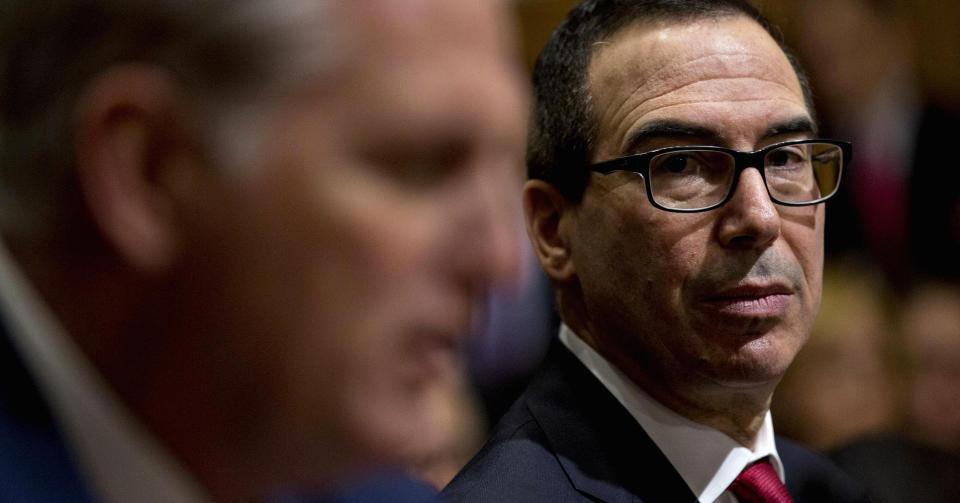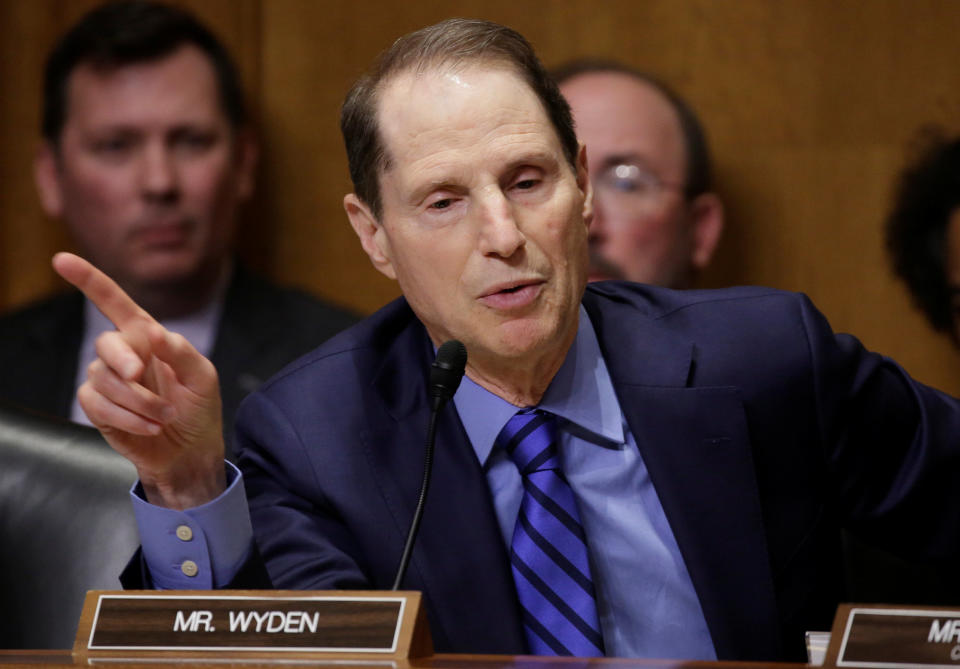More details emerge on Trump’s plan to slash taxes
Donald Trump’s presidential campaign needed better tax analysts.
That was the suggestion made by Steven Mnuchin, Donald Trump’s nominee for Treasury Secretary, at his confirmation hearing before the Senate Finance Committee on Thursday. When asked about the tax plan Trump published last fall—which third-party analysts said would add more than $7 trillion to the national debt—Mnuchin said somewhat apologetically, “We had a rather modest campaign staff. I look forward to having access to all the people at Treasury able to model these things.”
Now that Trump and his top advisers have to fill in the blanks on broad plans released during the campaign, some important new details are emerging.
Mnuchin, for instance, said at his hearing, “We want to make sure tax reform doesn’t increase the size of the deficit.” That’s a sharper distinction than Trump drew during the campaign, and it suggests there could be stricter limits on how much Trump will be able to cut taxes than the incoming president has acknowledged up until now.

Mnuchin did add that he believes the Trump tax plan, whenever it arrives, should be evaluated based on “dynamic scoring,” a controversial method that would lower the presumed cost of tax cuts to the Treasury. Such a dynamic model would account for stronger economic growth due to the stimulative nature of tax cuts, which in turn would produce more economic activity and, in theory, more tax revenue. A static model, by contrast, would simply account for revenue lost to tax cuts, without an allowance for faster growth. So on paper, tax cuts analyzed with dynamic scoring seemingly cost less. Yet even with dynamic scoring, Trump may have to scale back his tax-cut plan if he really intends not to add to the deficit.

Mnuchin also provided a bit more clarity on the “border taxes” Trump has been tweeting about, saying Trump has no plan to institute across-the-board tax cuts on imports. Instead, those taxes would be levied only on specific companies that move jobs out of the United States and import products back into the country. “He’s referred to a small number of companies moving jobs and putting products back into the United States,” Mnuchin said. “In no way has he contemplated a broad 35% border tax.”
Like Wilbur Ross, Trump’s nominee for Commerce Secretary, Mnuchin outlined plans to revamp trade deals with Mexico and China that sound less draconian than what has come out of Trump’s own mouth. With regard to the North American Free Trade Agreement, which Trump faults for killing American jobs, Mnuchin said, “I’m optimistic we can renegotiate that deal in a way that is advantageous for us and advantageous for Mexico, and is a win-win for both countries.”
As expected, Democratic senators hammered Mnuchin over his leadership of OneWest, a California lender formed from the wreckage of the failed IndyMac bank, which Mnuchin and a group of investors bought in 2009. Between 2009 and 2015, OneWest processed roughly 36,000 foreclosures, virtually all of them inherited from IndyMac. Mnuchin apologized for mistakes that led to some inappropriate foreclosures and said OneWest had compensated people treated unfairly. He largely survived the Democratic pummeling and seems like to be confirmed as Trump’s Treasury Secretary.
In that role, he’ll lead the tax reform plan Trump has promised to make one of his top priorities. Trump’s plan is to cut the corporate tax rate from 35% to 15%, in order to make the United States a more attractive place to do business, and kill the incentive for US firms to mount “inversions” that allow them to relocate their headquarters to lower-tax countries. Mnuchin argues this could also lead big US firms such as Apple (AAPL), Alphabet (GOOG, GOOGL), Microsoft (MSFT), General Electric (GE) and many other companies to bring more than $3 trillion in profits being held overseas back to the United States, so that money can be spent here.
Trump also wants to slash individual tax rates and simplify the filing process for millions of Americans. The challenge will be making sure tax cuts are spread around in a way that appears to benefit everybody. On paper, the tax plan Trump published during the campaign would cut taxes for the top 1% of earners by $215,000 per year, while the savings for the middle 20% would only be about $1,000.

Mnuchin said on TV after Trump nominated him that there will be “no absolute tax cuts for the upper class,” because lower rates on income for the wealthy would be offset by fewer deductions for things like expensive homes and charitable donations. Mnuchin didn’t exactly repeat that claim at his confirmation hearing—but his Democratic interrogators did. Sen. Ron Wyden of Oregon declared this formulation “the Mnuchin Rule” and said Trump’s plan must meet this standard.
Democrats are already grumbling about tax cuts Trump would grant the wealthy by repealing Obamacare, which includes new taxes on the high earners meant to help pay for subsidies granted to low-income workers to help them buy health insurance. Mnuchin insisted that once Trump’s tax reforms are evaluated in whole, including both business and personal tax reform, they will seem much more beneficial to the middle class.
He also reassured senators—and markets—regarding a few other Trump bombshells. While campaigning, for instance, Trump insisted the United States could renegotiate its outstanding debt in a crisis and pay something less than 100 cents on the dollar—the way Trump has done in various casino bankruptcies.
Mnuchin walked that back by saying, “The president has made it perfectly clear that honoring the US debt is the most important thing.” He also encouraged senators to pass a needed debt-ceiling extension in coming weeks without any drama, instead of waiting until the last second and raising the specter of another government shutdown similar to the one that occurred in the fall of 2013.
As some onlookers expected, Mnuchin tamped down Trump’s recent comments about the US dollar being too strong, which had touched off a sharp selloff in the world’s reserve currency. But Mnuchin’s clarification was itself a somewhat convoluted statement on the difference between short-term and long-term moves in the value of the dollar: “When the president-elect made a comment on the US currency, it wasn’t meant to be a long term comment,” Mnuchin said, apparently hoping to convince investors Trump was only making an observation, not signaling a policy move when he said the dollar was too strong.
Mnuchin also found himself explaining offshore investments in Anguilla and the Cayman Islands he had directed as a hedge-fund manager, and suggested he’d support doing away with such tax dodges. “In the hedge fund world, they’re just set up to make the accountants rich,” he said. “I would support changing the tax laws to make sure they’re simpler and more effective.” If anybody knows how to find the shadiest loopholes, Mnuchin seems to be the guy.
Editor’s note: This story has been corrected to indicate that Sen. Ron Wyden is a Democrat from Oregon, not Delaware. The author knows better and regrets the mistake.
Rick Newman is the author of four books, including Rebounders: How Winners Pivot from Setback to Success. Follow him on Twitter: @rickjnewman.

